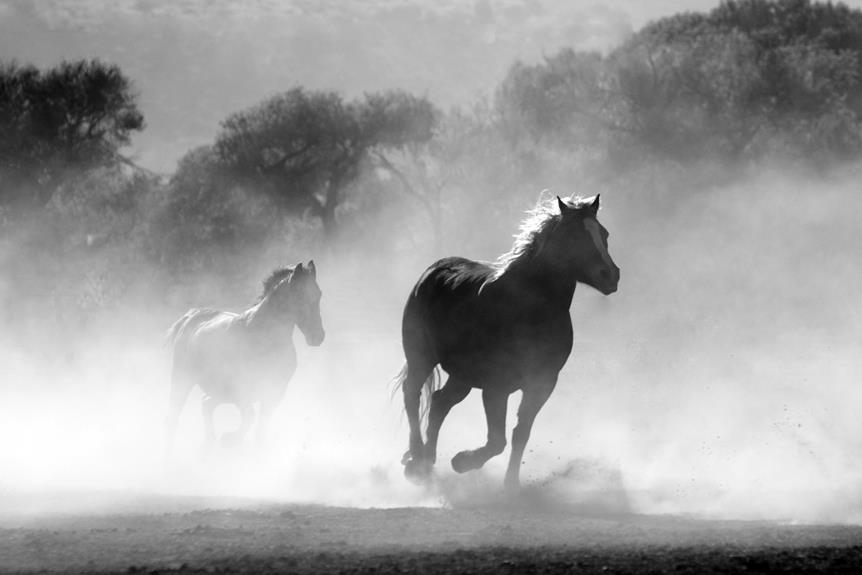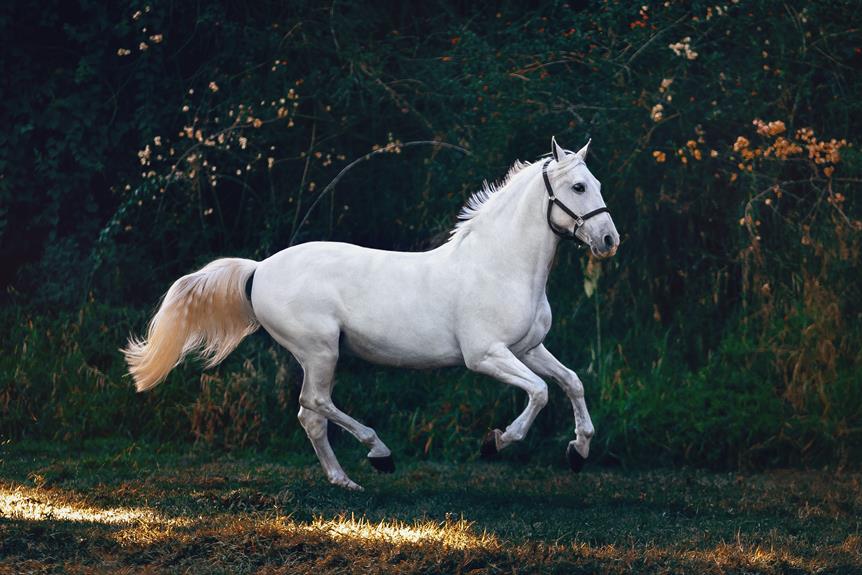Have you ever wondered what exactly is a grade horse? While you may have heard the term before, you might not be entirely sure of its meaning.
Well, fear not, because in this discussion we will delve into the world of grade horses and unravel the mysteries surrounding them.
From their definition and characteristics to their potential in various riding disciplines, we will explore the advantages and disadvantages of owning a grade horse.
So, if you're curious to learn more about these versatile equines and discover why they might be the perfect fit for you, then keep on reading.
Key Takeaways
- Grade horses are horses with unknown or mixed parentage, lacking registration papers and official documentation of their lineage.
- They can come from various horse breeds, resulting in a unique combination of traits.
- Grade horses are adaptable and can excel in a variety of disciplines, including trail riding, show jumping, dressage, eventing, and endurance riding.
- While they may not have the prestige of specific horse breeds, grade horses are more affordable, long-lived, and sturdy, making them a reliable choice for a wider range of buyers.
The Definition of a Grade Horse
The definition of a grade horse is a horse with unknown or mixed parentage, distinguishing it from purebred and deliberately crossbred horses. Grade horses are those that aren't registered, meaning they don't have official documentation of their lineage. Unlike purebred horses, grade horses don't have papers to prove their ancestry. This is why they're often referred to as 'horses without papers.'
Grade horses can result from unintentional breedings or have partially known breeding but still lack registration papers. Despite not having a pedigree, grade horses can still be valuable and versatile. They're usually sold for significantly less money than registered horses, making them a more affordable option for those who don't need to buy a purebred horse.
Grade horses can be used for a variety of purposes, such as trail riding, ranch work, and pleasure riding. Their appearance, size, and abilities can vary widely, but experienced horsepeople can identify grade horses based on breed type even without registration.
Characteristics of Grade Horses
If you're considering a grade horse, understanding the characteristics of these versatile equines is essential. Grade horses are horses that don't have registration papers and aren't considered purebred. They may come from various horse breeds, resulting in a unique combination of traits.
One of the advantages of grade horses is their adaptability. They can excel in a variety of disciplines, such as trail riding, ranch work, or even competitive events. Their level of training may vary, as they come from diverse backgrounds. Some grade horses may have extensive training and be suitable for advanced riders, while others may require more work and patience.
It's important to note that grade horses may have physical limitations, depending on their individual conformation and health. While they may not be eligible to compete in breed-specific shows, they can still participate in other events and enjoy various activities.
Another fun thing about grade horses is that they're generally less expensive compared to registered purebred horses. So, if you're looking for a versatile and budget-friendly equine companion, a grade horse might be the perfect choice for you.
Riding Disciplines for Grade Horses
When considering grade horses, their versatility in various riding disciplines is a key factor to consider. Grade horses may not have the pedigree of a registered horse, but they can excel in a variety of activities. Here are three riding disciplines where grade horses can shine:
- Trail Riding: Grade horses are often the go-to choice for trail riding due to their sturdiness and adaptability. They can navigate through different terrains and handle long hours on the trail with ease. Their mixed genes make them hardy and less prone to certain health issues.
- Show Jumping: Despite their unknown parentage, grade horses can surprise you with their jumping abilities. With proper training and conditioning, they can excel in the show jumping arena. Their athleticism and natural agility can make them competitive against registered horses.
- Sport Horse: Grade horses can also be trained for various sport horse disciplines, such as dressage, eventing, and endurance riding. Their versatility allows them to perform well in different arenas, showcasing their adaptability and willingness to learn.
While grade horses may not have the prestige of specific horse breeds or registered horses, their affordability, longevity, and versatility make them excellent choices for riders of all levels. Don't underestimate the potential of a grade horse; they can be some of the best horses you'll ever ride, just like their purebred counterparts, such as Arabian horses.
Where to Find and Buy Grade Horses
After learning about the various riding disciplines where grade horses can excel, it's important to know where you can find and buy these versatile equines. When looking to buy a grade horse, you have several options available.
One option is to search for grade horses in online auctions, sale websites, and classified ads. While these horses may not have registration papers, they can still be excellent riding companions.
Another option is to explore local horse rescues and shelters, as they often have grade horses available for adoption. These horses may not have papers either, but they can make great riding partners and provide a loving home.
Additionally, attending horse shows and events can be a great way to find grade horses for sale or adoption. Keep in mind that some breeders may sell horses that could be registered as grade, but they may choose not to provide papers or register the horse.
Lastly, consider reaching out to trainers or experienced horse owners who may know of grade horses available for purchase. With these options, you can find and buy a grade horse that suits your riding needs, regardless of their registration status.
Advantages and Disadvantages of Grade Horses
Grade horses offer both advantages and disadvantages for potential buyers and owners. Here are the advantages and disadvantages of owning a grade horse:
Advantages:
- Affordability: Grade horses are typically more affordable than registered horses, making them accessible to a wider range of buyers. This affordability allows more people to experience the joy of horse ownership and participate in activities such as riding lessons or trail riding.
- Versatility: Grade horses can excel in various disciplines and some outperform purebred horses. Their mixed lineage can create a unique combination of traits that make them versatile and capable of performing just as well as their purebred counterparts.
- Genetic Health: Grade horses often have fewer genetic health issues compared to purebred horses. This contributes to their long-lived and sturdy nature, making them a reliable and low-maintenance choice for owners.
Disadvantages:
- Ineligibility for Breed-Specific Shows: Grade horses are ineligible for breed-specific shows, which limits their participation in certain competitions and events. This can be disappointing for owners who wish to showcase their horse's abilities in breed-specific arenas.
- Unknown Parentage: The growth pattern of grade horses is less predictable due to unknown parentage. This can make it challenging to anticipate the horse's development and potential, requiring a deeper understanding of the individual horse.
- Limited Suitability: Grade horses may not possess certain traits and characteristics found in specific purebred horses. This can limit their suitability for certain disciplines and competitions, requiring owners to carefully consider their horse's abilities before entering them into specific activities.
Frequently Asked Questions
What Is the Difference Between Registered and Grade Horses?
The difference between registered and grade horses is that registered horses have documented parentage and can participate in shows and breeding. They also have specific traits to look for and a registration process to follow. Grade horses, on the other hand, have unknown or mixed parentage but can still be valuable and versatile in various disciplines. When determining their value, consider their talent, performance, and abilities.
Are Grade Horses Good?
Grade horses can be good depending on your needs. They may require different training techniques and have unique health and maintenance requirements. Consider your riding style, discipline, and the horse's nutrition. Building trust and understanding equine behavior is crucial.
How Much Is a Grade Horse Worth?
When determining the worth of a grade horse, consider factors like market demand, training level, age, health, performance records, and bloodlines influence. Also, conformation evaluations and temperament assessments play a role in determining value.
What Does It Mean When a Horse Is a Grade?
When a horse is a grade, it means that their parentage is unknown or mixed, and they aren't registered with a breed organization. Grade horses can be versatile and affordable, but require proper training, healthcare, and finding the right fit for your needs.
Conclusion
In conclusion, if you're looking for a versatile and affordable horse, a grade horse may be the perfect choice for you. With their varied sizes, shapes, and colors, grade horses can excel in various riding disciplines.
While they may not have the prestige of registered horses, they can still outperform their purebred counterparts.
So, whether you're a beginner or an experienced rider, consider the advantages and disadvantages of grade horses and find the perfect companion for your equestrian adventures.



0 Comments